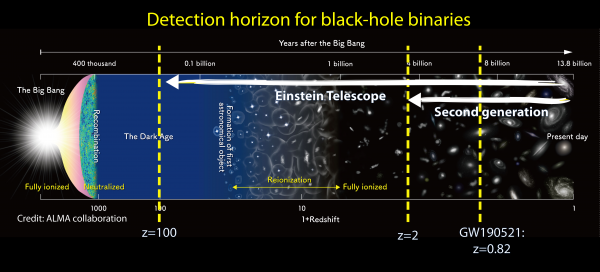Difference between revisions of "Cosmology: Probing the Early Universe"
| Line 1: | Line 1: | ||
| − | [[File:BigBang_JH. | + | [[File:BigBang_JH.png|Black-hole detection horizon|thumb|600px]] |
Recent assessments of the science case for third-generation GW detectors like Einstein Telescope, and Cosmic Explorer have demonstrated the tremendous impact GW observations are expected to have on cosmology in the future [[https://arxiv.org/abs/1903.09260 Sathyaprakash et al (2019)]] [[http://dx.doi.org/10.1088/1475-7516/2020/03/050 Maggiore et al (2020)]]. This includes the study of compact-binary populations throughout the history of the universe, the exploration of dark matter and energy, and studies of the expansion of the universe using GW signals to construct a new cosmic distance ladder. In addition, certain forms of primordial GW backgrounds might become observable with third-generation detectors. | Recent assessments of the science case for third-generation GW detectors like Einstein Telescope, and Cosmic Explorer have demonstrated the tremendous impact GW observations are expected to have on cosmology in the future [[https://arxiv.org/abs/1903.09260 Sathyaprakash et al (2019)]] [[http://dx.doi.org/10.1088/1475-7516/2020/03/050 Maggiore et al (2020)]]. This includes the study of compact-binary populations throughout the history of the universe, the exploration of dark matter and energy, and studies of the expansion of the universe using GW signals to construct a new cosmic distance ladder. In addition, certain forms of primordial GW backgrounds might become observable with third-generation detectors. | ||
Primordial GW backgrounds will be extremely weak and need to be dug out of instrument noise and astrophysical GW foregrounds. We combined one of the proposed methods, a noise projection based on a geometrical interpretation of the matched-filter parameter estimation, to reduce an astrophysical foreground with a state-of-the-art simulation and Bayesian analysis software Bilby [[https://doi.org/10.1103/PhysRevD.102.063009 Sharma / Harms (2020)]]. It was found in this study that the subtraction of high-SNR signals would leave significant residuals in the data, but these can be sufficiently reduced by the noise-projection method. This study needs to be repeated for lower-SNR signals. | Primordial GW backgrounds will be extremely weak and need to be dug out of instrument noise and astrophysical GW foregrounds. We combined one of the proposed methods, a noise projection based on a geometrical interpretation of the matched-filter parameter estimation, to reduce an astrophysical foreground with a state-of-the-art simulation and Bayesian analysis software Bilby [[https://doi.org/10.1103/PhysRevD.102.063009 Sharma / Harms (2020)]]. It was found in this study that the subtraction of high-SNR signals would leave significant residuals in the data, but these can be sufficiently reduced by the noise-projection method. This study needs to be repeated for lower-SNR signals. | ||
Revision as of 09:56, 13 September 2020
Recent assessments of the science case for third-generation GW detectors like Einstein Telescope, and Cosmic Explorer have demonstrated the tremendous impact GW observations are expected to have on cosmology in the future [Sathyaprakash et al (2019)] [Maggiore et al (2020)]. This includes the study of compact-binary populations throughout the history of the universe, the exploration of dark matter and energy, and studies of the expansion of the universe using GW signals to construct a new cosmic distance ladder. In addition, certain forms of primordial GW backgrounds might become observable with third-generation detectors.
Primordial GW backgrounds will be extremely weak and need to be dug out of instrument noise and astrophysical GW foregrounds. We combined one of the proposed methods, a noise projection based on a geometrical interpretation of the matched-filter parameter estimation, to reduce an astrophysical foreground with a state-of-the-art simulation and Bayesian analysis software Bilby [Sharma / Harms (2020)]. It was found in this study that the subtraction of high-SNR signals would leave significant residuals in the data, but these can be sufficiently reduced by the noise-projection method. This study needs to be repeated for lower-SNR signals.
